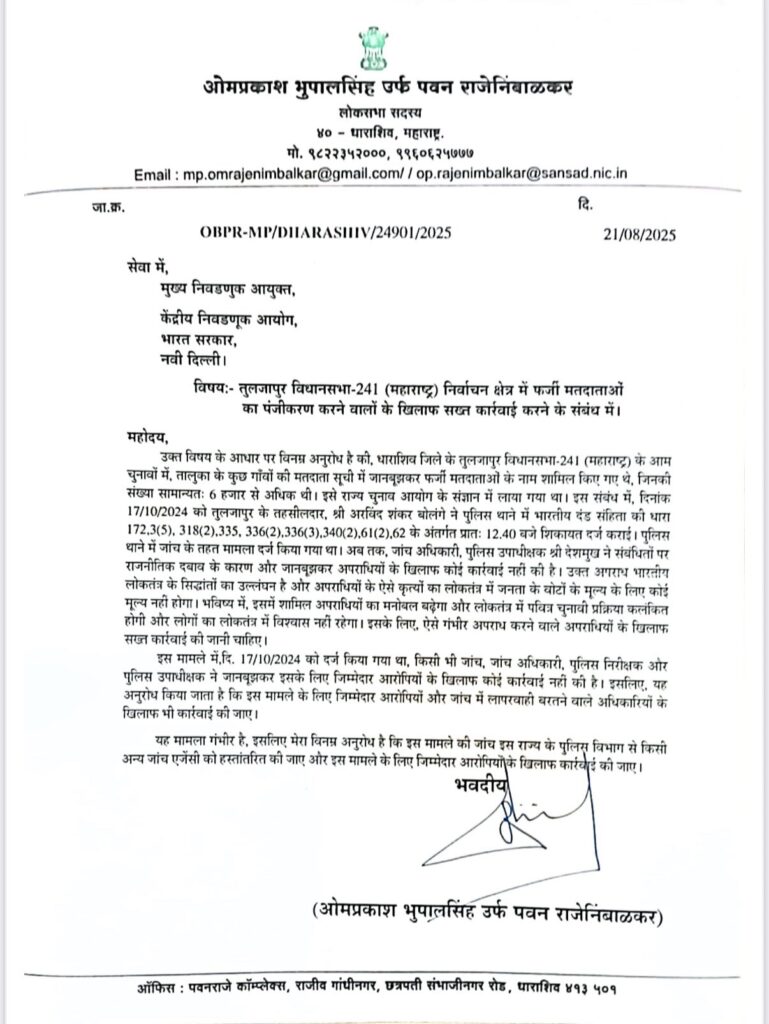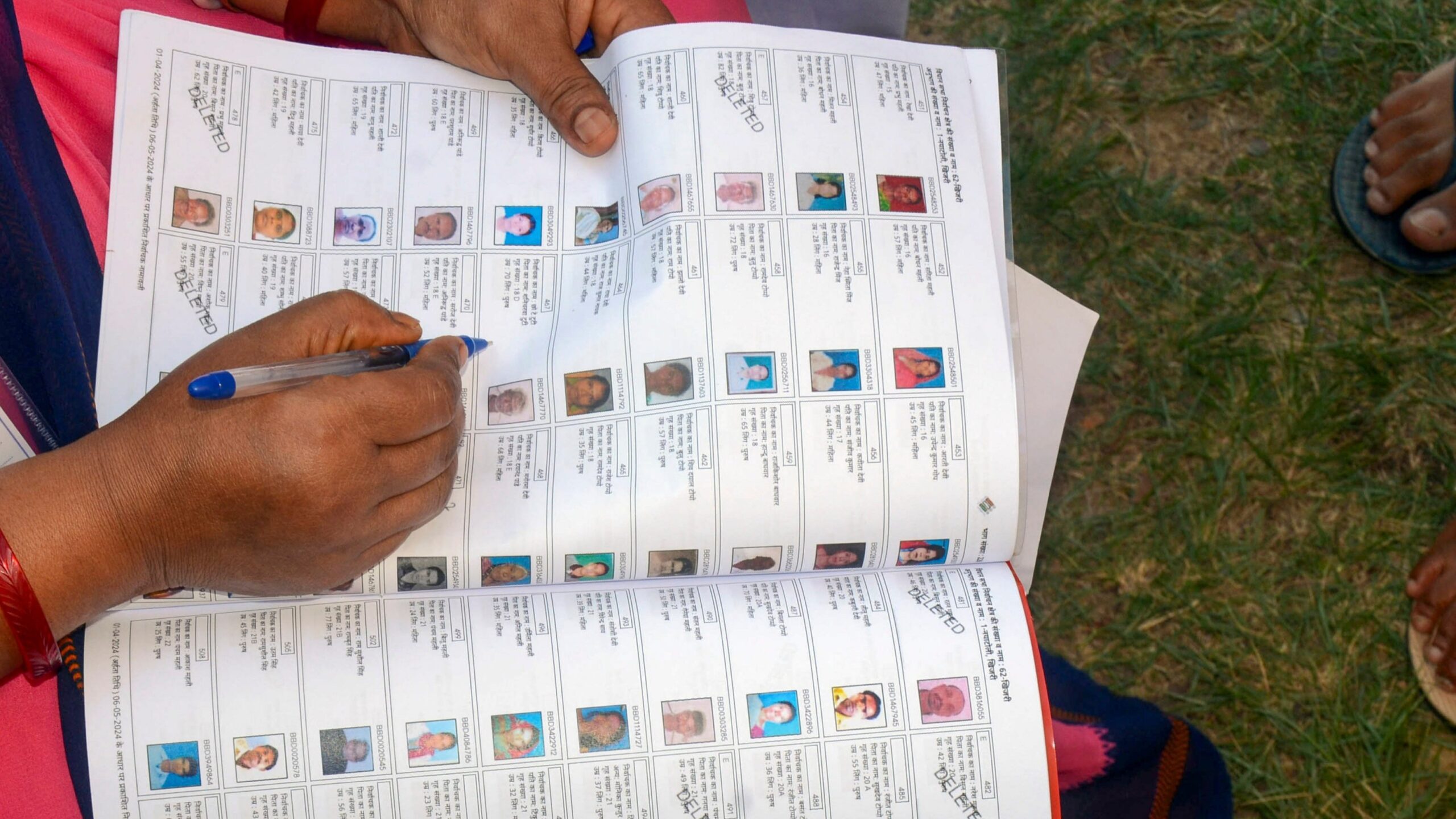In the Dharashiv district of Maharashtra, the Tuljapur Assembly constituency became the epicenter of a quiet but audacious attempt to corrupt the voter list. The malpractice was not uncovered through a complex data analysis but through a traditional, grassroots process known as Chavdi Vachan—the public reading of voter lists. During this exercise, conducted across nearly 100 polling booths, vigilant citizens and political workers noticed a suspicious surge in new voter registrations.
Tuljapur: the silent surge of 6,000 bogus voters
Following a formal complaint by office bearers of the Shiv Sena (UBT) and Member of Parliament, Omprakash Raje Nimbalkar, the Assistant Electoral Registration Officer (AERO), Arvind Bolange, conducted a preliminary inquiry. The findings were startling as more than 6,000 online applications for the addition of new voters were found to be bogus.
These applications were supported by a raft of forged documents, including counterfeit Aadhaar cards, fabricated photographs, and false names and addresses.

Omprakash Raje Nimbalkar’s Letter to ECI dated 21.08.2025
Recognising the gravity of the offense, the AERO promptly filed a First Information Report (FIR No. 476/2024) at the Tuljapur Police Station on October 17, 2024. Significantly, the FIR was not a blind complaint against unknown persons. It contained specific, actionable intelligence, including the names and mobile numbers of 40 individuals who had submitted batches of these fraudulent online applications. With such direct leads, a swift investigation to apprehend the perpetrators was expected.
However, ten months have elapsed since the FIR was registered, and the investigation has gone nowhere. The 40 named individuals have not been summoned for questioning, let alone arrested. The trail, which was warm at the time of filing the complaint, has been allowed to go cold. This conspicuous inaction by the police, which falls under the purview of Maharashtra’s Chief Minister and Home Minister, has led to accusations of deliberate obstruction.
Shri Nimbalkar has been vocal about the institutional paralysis. “Due to political pressure, no action has been taken against any accused,” he stated, highlighting a deliberate effort to shield the culprits. He has since escalated the matter, submitting a memorandum to both the Chief Election Commissioner of India and the State Election Commissioner. In his communication, he reveals the “deliberate delay” and demanded accountability from the EC.
Fraud by the Election Commission of India: Over 6,000 Fake Voter Registration Applications
Even after 10 months since the FIR was filed, neither investigation has progressed nor have the accused been traced.
In Dharashiv district of Maharashtra, at Tuljapur Police Station,… pic.twitter.com/79ruLPgYWG
— Omprakash Rajenimbalkar (@OmRajenimbalkr) August 21, 2025
Mere MITRON,🆘
Three Cases from Maharashtra and Karnataka that show the apparent NEXUS between BJP + ECI to BLOCK THE POLICE INVESTIGATIONS.
1. ALAND AC, Karnataka.
▪️Based on Congress candidate from Aland AC, Shri. B.R. Patil’s complaint, the ERO filed an FIR in 2023… pic.twitter.com/lYayJf9zhU
— Raju Parulekar (@rajuparulekar) September 21, 2025
Panvel and Uran: a phantom electorate of 85,000
While Tuljapur witnessed the fraudulent addition of voters, the coastal constituencies of Panvel and Uran in Raigad district presented a different, yet equally disturbing, form of electoral manipulation as the mass duplication of existing voters. The issue was brought to light not by election officials, but through the painstaking efforts of a political candidate, Shri Balaram Patil of the Peasants and Workers’ Party (PWP).
An investigation reveals large duplication
In the lead-up to the 2024 Maharashtra Assembly election, buoyed by the opposition MVA’s strong performance in the preceding Lok Sabha polls, Patil’s team began investigating rumors of irregularities in the electoral rolls. Their analysis revealed a total of 85,211 duplicate voter entries spread across Panvel and its neighbouring constituencies. The breakdown was concerning as;
- Panvel AC: 25,855 names were found listed twice, thrice, or even four times.
- Uran AC: 27,275 voters were registered more than once.
- Airoli AC: 16,096 duplicate names were identified.
- Belapur AC: 15,397 voters were also present on the Panvel roll.
Armed with this mountain of evidence, Patil approached the Sub-Divisional Officer (SDO) of Panvel, who also served as the Returning Officer (RO) for the election, requesting the immediate deletion of these duplicate entries. For nearly 15 days, his request was met with silence.
Frustrated by the SDO’s inaction, Patil filed a writ petition in the Bombay High Court on September 26, 2024. The court recognised the seriousness of the complaint and, in a swift directive, ordered on October 7, 2024 the SDO to take an “appropriate decision” within two weeks.
The order of Bombay High Court 07.10.2024 can be read here
Accountability blurred by the procedural pretext
As the High Court’s deadline approached, a convenient precedent emerged from another part of the state. In the Muktainagar constituency, a Shiv Sena MLA, Chandrakant Patil, had approached the Aurangabad bench of the Bombay High Court with a similar plea to clean up the rolls.
However, his petition was filed after the Assembly election schedule had been announced. On October 18, 2024, the court rejected his plea, reasoning that, “Since the elections have been declared now, it will not be possible… that the Election Commission would be in a position to correct the electoral roll”, as the Frontline Reported
According to the Frontline, the Panvel SDO seized upon this ruling. On October 23, 2024, citing the Muktainagar order as a justification, the SDO rejected Balaram Patil’s plea as well, despite the fact that Patil had approached the authorities and the court well before the election schedule was announced. The compromised electoral rolls, bloated with over 85,000 duplicate entries, were left unchanged.
The election took place on November 20, and when the results were declared on November 23, the BJP’s Prashant Thakur was declared the winner with 1, 83,931 votes, defeating Patil by a margin of 51,091 votes. Refusing to accept a result he believed was tainted, Patil embarked on a second, more intensive investigation.
Exposing the fraud, one booth at a time
According to the Frontline, Patil’s first move was to request the official marked electoral rolls—the lists used by polling officers to tick off voters as they cast their ballots—from the SDOs of Panvel, Uran, Airoli, and Belapur. His requests were stonewalled as the Panvel SDO claimed the data could not be shared without a court order. Undeterred, Patil turned to his own network of Booth Level Assistants (BLAs), who had kept their own marked copies of the voter lists from polling day.
His team began the laborious task of digitising and cross-referencing the data from Panvel’s 574 booths. As of their latest update, they had analysed the data from 490 booths and found definitive proof of 11,628 votes that had been cast two or more times by the same individuals using different Voter ID (EPIC) cards.
The examples are brazen:
- Pradeep Poraji, aged 23, with EPIC ID RSC6522387, voted at Booth No. 4. The same Pradeep Poraji, with the same photograph and father’s name (Ramu Poraji), but listed as 22 years old with EPIC ID RSC5081641, also voted at Booth No. 310.
- Prachi Dongare, aged 18, was registered at Booth No. 1 with EPIC ID RSC6376198. The exact same person, with identical details, was also registered at Booth No. 2 with EPIC ID RSC6381800.
- Neha Vivek Kulkarni, aged 27, was registered at Booth No. 4 with EPIC ID UZZ9331422. She was also registered at Booth No. 2 as a 28-year-old with EPIC ID RSC6678189.
Patil projects that once the analysis of the remaining booths is complete, the number of such multiply-cast votes will cross 17,000. This is not a clerical error; it is evidence of systemic fraud.
Having compiled this damning evidence, Patil approached the Chief Electoral Officer of Maharashtra and the Chief Election Commissioner of India in June, mailing them the complete details. He has yet to receive a response. His faith in the institution has eroded completely. “Frankly speaking, I do not have any hope from the ECI,” he stated. “Because my allegation is that this malpractice is being done by the BJP with the active help of the Election Commission… This is daylight robbery of the election”, as reported
The situation is further compounded by the SDO’s blatant disregard for the Bombay High Court’s directive. This failure to act constitutes contempt of court, and Patil is now planning to file a formal complaint. The Panvel-Uran case exposes a multi-layered failure, from the initial refusal of the RO to clean the rolls to the subsequent failure of the ECI to investigate concrete proof of multiple voting, all while a High Court order was brazenly ignored.
The Aland case: a blueprint of obstruction
The events in Maharashtra do not exist in a vacuum. They mirror a similar, well-documented case in the Aland constituency of Karnataka, which serves as a blueprint for how such electoral fraud is executed and subsequently protected from investigation.
A stalled probe and allegations of protection
In February 2023, following a complaint by Congress candidate Shri B.R. Patil, an FIR (No. 26/2023) was filed in Aland after the discovery of 5,994 fraudulent online applications (Form 7) for the deletion of voters. The case was handed over to the Karnataka Criminal Investigation Department (CID), which quickly found evidence of a sophisticated operation involving automated software, fake logins, and mobile numbers from outside the state to target and delete voters perceived to be Congress supporters.
The investigation, however, hit a wall erected by the Election Commission of India. To trace the perpetrators, the CID required crucial technical data: the Destination IP address and Destination Port for the online submissions. This information would pinpoint the specific devices used for the fraud. Despite sending at least 18 letters to the ECI through the Karnataka CEO, the CID has not received this critical data. The ECI’s refusal to provide “last mile information” has effectively stalled the probe for over a year, preventing the CID from identifying the masterminds.
The evidence was presented by Leader of Opposition and Congress MP Rahul Gandhi in a special press conference called “Vote Chori Factory,” held on September 18, 2025. In the case pointed to a highly organised effort, characterised by:
- Identity Hijacking: The credentials of unsuspecting voters, like retired principal Suryakant Govin, were used to file mass deletion requests without their knowledge.
- Automated Speed: Applications were filed at a “humanly impossible” speed, such as two forms in 36 seconds, indicating the use of a software program.
- Targeted Deletions: The booths with the highest number of deletion requests were overwhelmingly Congress strongholds.
The Aland case establishes a troubling precedent. It demonstrates a clear pattern where, despite the initiation of a criminal investigation into a large-scale electoral offense, the probe is effectively paralysed by the ECI’s non-cooperation, leading to accusations that the commission is protecting the perpetrators.
The crisis of democratic integrity
Viewed together, the cases of Tuljapur, Panvel, Uran, and Aland paint a deeply concerning picture of the health of India’s electoral democracy. These are not isolated clerical errors but point to what appears to be a “systematic and sophisticated attempt… to manipulate the voting and fraudulently obtain the mandate.” The common threads are undeniable as the use of technology to execute large-scale fraud, the inaction and evasion of local election officials and police, and a consistent pattern of stonewalling from the highest levels of the Election Commission of India.
The refusal to investigate 40 named suspects in Tuljapur, the defiance of a High Court order in Panvel, and the withholding of crucial technical data from the CID in Aland collectively suggest a systemic breakdown of accountability. It raises an uncomfortable but essential question: Is this systematic manipulation the reason why pressing national issues—from economic distress and unemployment to national security challenges—seem to have a diminishing impact on the electoral mandates of the ruling establishment?
When the very foundation of the democratic process—a clean and fair electoral roll—is compromised, the will of the people becomes dangerously malleable, and the entire edifice of representative government is threatened.
Related:
